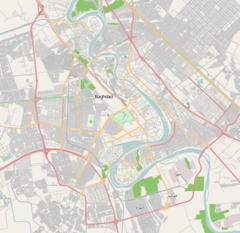Mausoleum of Umar Suhrawardi
| Mausoleum of Umar Suhrawardi Mosque and the Tomb of the Sheikh Umar Suhrawardi | |
|---|---|
 Mausoleum of Umar Suhrawardi, 2017. | |
| Religion | |
| Affiliation | Sunni Islam |
| Ecclesiastical or organisational status | Mosque and mausoleum |
| Patron | Shahab al-Din Abu Hafs Umar Suhrawardi |
| Status | Active |
| Location | |
| Location | Baghdad, Iraq |
Location in Baghdad, Iraq | |
| Geographic coordinates | 33°21′2″N 44°24′7″E / 33.35056°N 44.40194°E |
| Architecture | |
| Type | Mosque and shrine |
| Style | Abbasid, Seljuk |
| Specifications | |
| Capacity | 400 worshippers |
| Dome(s) | 1 |
| Minaret(s) | 1 |
| Shrine(s) | 2 |
The Mausoleum of Umar Suhrawardi, or the Mosque and the Tomb of the Sheikh Umar Suhrawardi (Arabic: جامع ومرقد الشيخ عمر السهروردي, romanized: Suhrawardi Mausoleum),[1] is a historic complex of a mausoleum and a mosque, located in Baghdad, Iraq. The complex dates back to the Abbasid Caliphate and is dedicated to Shihab al-Din 'Umar al-Suhrawardi, the founder of Suhrawardi order of Sufism. The mosque is located between the Sheikh Umar Street and Bab al-Wastani of the Baghdad wall, in the southern part of al-Rusafa. The mosque can be overlooked from the Muhammad al-Qasim Highway and approximately one kilometre (zero point six two miles) away from the city center.[2]
History
[edit]The construction of the mosque dates back to the 12th century, and the mosque was named after Umar Suhrawardi who was buried in the nearby cemetery. The mosque was renovated by Ismail Pasha in 1902 until 1926. Another renovation was conducted in 1964 by the ministry of endowment.[3] In 2010, it was reported that the minaret is in danger of collapsing.[4]
Construction
[edit]Inside the building complex, there is a Jama'at Khana of approximately 600 square metres (6,500 sq ft) and a marble-coated dome based on the ten pillars in addition to the thick wall surrounding them. In front of the Jama'at Khana is the prayer hall, which is part of the mosque. Inside the Jama'at Khana is a door leading to the tomb of Umar Suhrawardi, which is opposite a smaller room containing the grave of one of Umar Suhrawardi's students. The tomb chamber is small, and Umar Suhrawardi's grave is covered with a wooden zarih. On top of the shrine is a unique conical dome built in Seljuq architectural style. Inside the mosque, there is another musholla for summertime surrounding the old cemetery and a place for salah (five ritual daily prayers) that can accommodate up to 400 worshippers.[5] The surrounding cemetery was originally called Al-Wardiyya Cemetery, but it was renamed to Sheikh Umar Cemetery after the burial of Umar Suhrawardi there.[4]
Gallery
[edit]-
Umar al-Suhrawardi Mosque
-
Mausoleum of Umar Suhrawardi, 1924.
See also
[edit]References
[edit]- ^ US Department of Defense. "021. Baghdad - Suhrawardi Mausoleum". Cultural Property Training Resources. Colorado State University. Retrieved January 4, 2018.
- ^ الدليل السياحي للأضرحة والمقامات في العراق - دائرة الأضرحة والمقامات والمراقد السنية العامة. p.33.
- ^ مسجد السهروردي Archived 2017-01-04 at the Wayback Machine. Masajed Iraq. Retrieved January 4, 2018.
- ^ a b منارة السهروردي ببغداد مهددة بالسقوط. Al-Jazeera. Retrieved January 4, 2018.
- ^ دليل الجوامع والمساجد التراثية والأثرية - ديوان الوقف السني في العراق. p.60.



